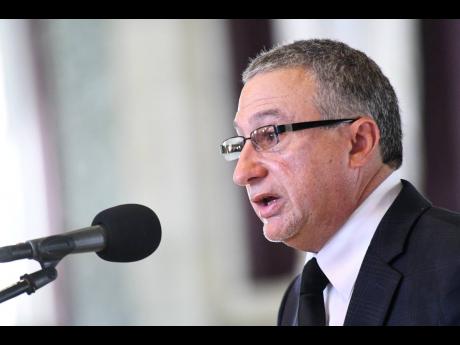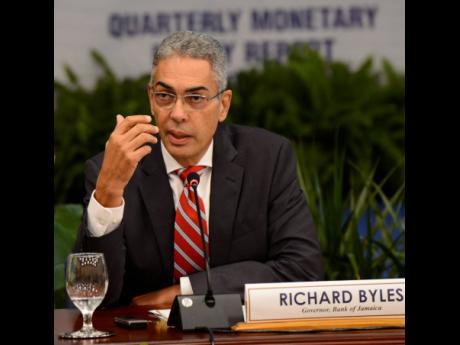Seaga labels Byles’ wage stance ‘insensitive’
The Private Sector Organisation of Jamaica (PSOJ) has criticised Bank of Jamaica (BOJ) Governor Richard Byles for cautioning private businesses against giving substantial salary increases amid sustained inflationary challenges affecting the country.
Speaking with The Gleaner yesterday, PSOJ President Metry Seaga said that, while Byles’ statement may be correct, it was “insensitive”.
“I don’t know if it needed to be said by the governor at this point, certainly in the face of the Government just giving an approximate 30 per cent salary increase across the board to public sector workers, and parliamentarians getting almost 300 per cent increase,” Seaga said.
“I think it was an insensitive statement. It may be best if the governor had not said it. Our solution is about growing the economy so that wages can be higher and people can survive on a living wage,” the PSOJ boss added.
Seaga asserted that businesses pay as they have to.
He said that, if there is a shortage of labour and people are demanding more in salary, businesses will have to meet that demand.
He said businesses should pay more when and where they can, because employees are their “lifeblood”.
“It is a good thing when workers are paid more and their standards of living increase,” he said.
Cost-push effect
Byles, on Monday during the BOJ’s Quarterly Monetary Policy Report press briefing, cautioned the private sector against any massive wage increases, warning that a significant jump in salaries could have a negative effect on inflation.
“If we do get large wage increases and those translate into increased prices, then we are going to have a new cost-push effect on inflation. If those wage increases are not that substantial, or accompanied by increased productivity, then the impact on price increases should be nominal and not so much of a threat,” Byles said.
The BOJ head said, if the pay increases are within the seven per cent inflation rate, the impact will not be as significant.
However, he said, once it goes “significantly” above the inflation rate and is not accompanied by increased productivity, it will have an effect.
In a subsequent statement on Wednesday, the BOJ sought to buttress Byles’ comment, noting that a sizeable future wage adjustment, in the context of the tight domestic labour market, constitutes one of the potential headwinds that could result in higher-than-projected inflation in the future.
The central bank said, if significant wage increases translate into increased prices, inflation will have a cost-push effect.
It said if wage increases are accompanied by commensurate increases in productivity, such wage increases will not impact the inflation rate.
“Generally speaking, wage increases at the level of the current inflation rate will not have a significant inflationary impact,” the BOJ said.
Opposition Spokesman on Finance Julian Robinson said the market must be allowed to determine the prices paid for labour.
He said, if employers believe that they need to increase salaries to attract a specific type of worker, it is in their interest to do so.
“I understand the point that the governor is making in terms of trying to contain inflation, but I don’t think he can dictate to private companies how they should settle their industrial relations issues,” Robinson told The Gleaner yesterday.
He said the country’s low unemployment rate of 4.5 per cent suggests that more people are working and that there is a tightening in the labour market.
“People are going to demand higher salaries, particularly if they are in areas where they have particular skills,” he said.
Granville Valentine, general secretary of the National Workers Union (NWU), said Byles’ statement was likely to influence parties currently at the bargaining table.
“When you go to the negotiating table, inflation and cost of living are mere guides. You must first look at the ability to pay.
“You must look on the ability to produce better working conditions and you must also consider seriously, when you ask for certain skills. You must expect to pay for the training and education that these people would have had,” Valentine said.


